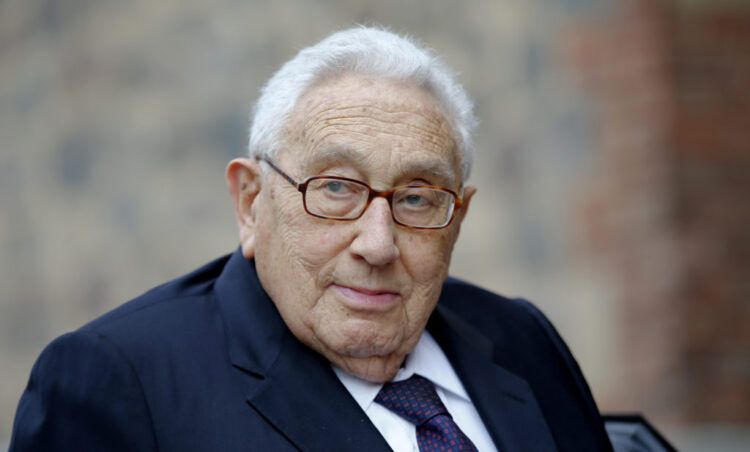By Aaron Miller-
Henry Kissinger, the renowned diplomat and former U.S. Secretary of State, passed away on Wednesday at the age of 100.
A towering figure in international relations, Kissinger’s(pictured) life was marked by a complex interplay of accomplishments and controversies that will define his legacy.
His life from fleeing the Nazis as a Jewish teenager to advising U.S. presidents, Kissinger’s legacy is a mosaic of contradictions that continues to divide opinion.
Kissinger’s diplomatic achievements were somehow compromised by the controversies that surrounded him and what he stood for, despite the enduring impact he leaves on the world stage.
The credit given to him for championing American hegemony and seeking to mediate between Israel and the Arabs faces the criticism of its long term failure, and the underlying selfishness of his pursuit of U.S dominance at the brutal expense of other countries.
Born in Furth, Germany, in 1923, to Jewish middle-class parents, Kissinger’s early life was shaped by the specter of rising anti-Semitism, leading his family to flee the Nazis and settle in New York in 1938.
After serving in the U.S. Army during World War II, Kissinger embarked on an illustrious academic career at Harvard University. His counter-intelligence roles in Germany and proficiency in native German positioned him as an invaluable asset in U.S. intelligence.
Kissinger’s journey into diplomacy began with part-time advisory roles under Presidents John F. Kennedy and Lyndon Johnson.
A realist who championed pragmatism over Cold War-era moralizing, Kissinger rose to prominence under President-elect Richard Nixon who appointed him as National Security Adviser in 1968.
This marked the beginning of Kissinger’s influential role in reshaping U.S. foreign policy, one that earned him both credit and heavy rebuke.
Triumphs and Controversies in Diplomacy
Kissinger’s diplomatic achievements are both celebrated and contested. The groundbreaking diplomatic opening of China to the U.S. landmark U.S.-Soviet arms deals, and his role in mediating between Israelis and Arabs are widely acknowledged.
However, his involvement in the Vietnam War and support for anti-communist dictatorships, particularly in Latin America, remain contentious topics.
Kissinger’s philosophy of realpolitik, emphasizing strategic choices and national interest, left an indelible mark on U.S. foreign policy. His “back-channel” talks paved the way for diplomatic openings with China and détente with the Soviet Union.
The controversial Vietnam War strategy, seeking “peace with honour,” prolonged the conflict but earned him a Nobel Peace Prize in 1973.

Henry Kissinger and President Nixon Image CBS via Getty Images
Kissinger’s strategy prolonged the war by four years and included secret bombing raids in Laos and Cambodia which claimed the lives of 22,000 American troops, and many more Southeast Asians, and helping the genocidal Khmer Rouge seize power in Cambodia.
His legacy is therefore not without its darker chapters, giving way to accusations of war crimes, particularly regarding secret bombing raids in Cambodia during the Vietnam War which have sparked debates about the morality of his realpolitik approach.
Kissinger is said to have told the U.S air force to strike “anything that flies or anything that moves”- his orders leading to the slaying of 50,000 civilians.
Journalist Christopher Hitchens’s book, “The Trial of Henry Kissinger,” made a case for war crimes prosecution, citing instances like the overthrow of Chile’s President Salvador Allende.
His 1979 memoir, White House Years, won a National Book Award for history, but his very confrontational and deadly approach attracted criticism by many who branded him a warmonger.
Post-Government Contributions and Longevity
After leaving government office at the end of Gerald Ford’s term, Kissinger continued to play a significant role in global affairs. His firm, Kissinger Associates, Inc., offered counsel on business strategy, and he remained a sought-after commentator on international conflicts.
At the age of 98, Kissinger co-authored a book on artificial intelligence, showcasing his adaptability to evolving technologies.
Kissinger’s legacy is not without its darker chapters.
Accusations of war crimes, particularly regarding secret bombing raids in Cambodia during the Vietnam War, have sparked debates about the morality of his realpolitik approach.
Journalist Christopher Hitchens’s book, “The Trial of Henry Kissinger,” made a case for war crimes prosecution, citing instances like the overthrow of Chile’s President Salvador Allende.
As Kissinger celebrated his centenary birthday, his unique longevity and continued activity into his 90s drew attention.
His son, David Kissinger, noted his father’s endurance amid policy differences with current Secretary of State Antony Blinken. Despite debates over his legacy, Kissinger’s imprint on two generations of policymakers remains undeniable.




